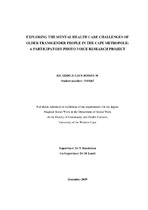Exploring the mental health care challenges of older transgender people in the Cape Metropole: A participatory photo voice research project
Abstract
This project was born after the researcher, a practicing social worker at a psychiatric facility,
observed the presence of high rates of anxiety and depressive disorders among transgender
patients. These patients were often also abandoned by their family or primary caregivers. This
research was part of a larger National Research Foundation (NRF) project in the Western
Cape and Gauteng, which explored LGBT older persons’ care needs. It differed from the main
project in that it focused on the mental health care challenges experienced by older
transgender people. The project was funded by the NRF and the researcher was allocated
funding from that project to explore LGBT aging and care in the marginalised areas. LGBT
discrimination has been indicated as a key factor in the onset of mental health issues later in
adulthood. Older adults are generally at a higher risk of developing mental disorders. The
older transgender community with mental health care needs thus often suffers multiple forms
of oppression within a heteronormative society. The aim of the research was to determine the
mental health care challenges experienced by older transgender people in the Cape Metropole,
Western Cape. Objectives to reach this aim included exploring and describing the unique
challenges faced by older transgender people, their experiences when accessing mental health
care, and describing strategies of addressing their mental health care needs.
The research methodology entailed a qualitative approach. Snowball sampling was applied for
selecting five older transgender participants and five key informants. Photo voice, a
Participatory Action Research (PAR) design, was used. Data collection consisted of in-depth
interviewing, focus groups, and photo journaling. Themes were developed from the data
utilising Thematic Analysis, aided by Atlas.ti software. Ethics and trustworthiness were
certified through guidance by the research supervisor. This research was classified as high
risk, since it involved marginalised individuals from the aged LGBT community. Anxiety in
the group was anticipated and dealt with by providing further counselling where needed.
The findings indicate that older transgender people experience minority stress across all racial
and age cohorts. They suffer heightened anxiety when accessing healthcare services, as they
anticipate transphobia and oppression. In addition, the intersectional socio-economic status of
age and gender identity seems to contribute to building resilience within the participants.
Lastly, substance use and social and professional support were identified as coping strategies
in the face of on-going discrimination.

